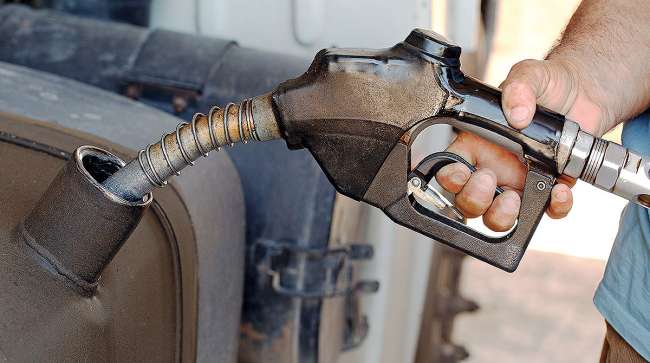Staff Reporter
Diesel Declines 2¢ a Gallon to $2.89

[Stay on top of transportation news: Get TTNews in your inbox.]
The price of diesel fuel declined by 2 cents a gallon nationally Feb. 17, according to the U.S. Energy Information Administration.
EIA reported that trucking’s main fuel dipped to $2.89 a gallon from $2.91 the previous week. Diesel now costs 11.6 cents a gallon less than it did a year ago. In the past two weeks, the price has fallen 6.6 cents.
All nine EIA regions saw price declines, ranging from 1.9 cents in the Midwest, where a gallon costs $2.757, to California, where the fuel dipped 1 cent to $3.774 a gallon. Diesel costs the most in California and the least in the Gulf Coast region, where it fell 1.7 cents to $2.658 a gallon.
U.S. average on-highway #diesel fuel price on 2/17/2020 was $2.890/gal, DOWN 2.0¢/gallon from 2/10/2020, DOWN 11.6¢/gallon from year ago https://t.co/mthWBpFWpN #truckers #shippers #fuelprices pic.twitter.com/PB4wwFzpIy — EIA (@EIAgov) February 19, 2020
Presidents Day pushed back the release of the numbers, but they are still reflective of Feb. 17. EIA typically releases fuel prices on Monday except on government holidays when the data is released the next day.
The price of regular unleaded gasoline increased nationwide, by 0.9 cent to $2.428 a gallon. Gas still is down 2.7 cents in the past two weeks. Prices declined in all regions, but the Midwest saw prices increase by 4.7 cents to $2.307. Gasoline currently costs 11.1 cents per gallon more than it did a year ago.
China has shut down whole cities and slowed its economy in a massive crackdown in a bid to slow the spread of the deadly coronavirus. These actions have had implication for the global economy along with demand for fuel prices.
“We’re starting to see there might be life ahead of the virus, and we’re looking toward a situation where the prices of the products are going to get a little bit of a bounce,” Phil Flynn, a senior energy analyst at The Price Futures Group, told Transport Topics.
U.S. average price for regular-grade #gasoline on 2/17/2020 was $2.428/gal, UP 0.9¢/gallon from 2/10/2020, UP 11.1¢/gallon from year ago https://t.co/RBwqbm71NH #gasprices pic.twitter.com/ezJDjxYPD9 — EIA (@EIAgov) February 19, 2020
The General Administration of Customs said that China is the largest importer of crude oil at more than 11 million barrels per day. The millions of people not working because of mandatory quarantines or personal concerns lessens demand for fuel, which in turn threatens prices.
“One of the major factors of gas and diesel prices falling in recent weeks has been concern about demand destruction,” Flynn said. “We’ve seen the prices really get hit in recent weeks because of that and with good reason. We did see demand destruction on a historic scale. But having said that, it looks like we may have priced in a lot of that bad news.”
The coronavirus has caused dozens of multinational corporations including Apple, Toyota, Volkswagen, Panasonic and Foxconn to suspend operations or reduce production at their Chinese facilities. Flynn said there may be stronger demand down the road because of all the pent-up demand currently.
“We can probably look forward to improving news,” Flynn said. “So I think that probably means the falling prices have probably stopped, and we’ll probably see the prices go up a little bit. Now that’s not unusual for this time of year, anyway.”
In part two of a two-part exploration of autonomous technology today, our latest RoadSigns podcast revisits conversations with Chuck Price of TuSimple and Ognen Stojanovski of Pronto.ai. Hear them discuss a palatable Level 2 version of trucking autonomy. Listen to a snippet above, and to hear the full episode, go to RoadSigns.TTNews.com.
The Chinese response may have impacted fuel prices, but they still remained relatively stable. Prices generally have gone down, but nothing resembling a freefall, which is good news for those in trucking who look for stability in the market.
“For the most part and for an extended period of time, we have had a fuel environment where prices are stable or falling slightly,” Melton Truck Lines Chief Financial Officer Robert Ragan told Transport Topics. “The shipping community and the carrier community prefer stability in the fuel markets. Volatility hurts the shippers.”
Ragan has found that fuel prices have remained stable, which he sees as being good for the industry. He notes companies would have unanticipated costs if fuel prices rise too quickly and also struggle to keep up with fuel surcharges.
“So stability is really the No. 1 thing I would point to as far as what we prefer when we’re looking at fuel expense,” Ragan said. “That price is probably not good for the oil and gas communities. They’d like to see it a little bit higher. And there are some sectors of trucking who focus on oil- and gas-related business in terms of what they ship so they’ll like to see it higher. But for the vast majority of the shipping and carrier communities, stable prices have been welcome to us.”
Want more news? Listen to today's daily briefing:





